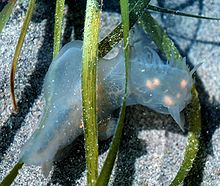- Melibe leonina
-
Hooded nudibranch 
Melibe leonina Scientific classification Kingdom: Animalia Phylum: Mollusca Class: Gastropoda (unranked): clade Heterobranchia
clade Euthyneura
clade Nudipleura
clade Nudibranchia
clade Dexiarchia
clade Cladobranchia
clade DendronotidaSuperfamily: Tritonioidea Family: Tethydidae Genus: Melibe Species: M. leonina Binomial name Melibe leonina
Gould, 1852Melibe leonina, common names the "hooded nudibranch" or the "lion's mane nudibranch", is a species of predatory sea slug, specifically a nudibranch, a marine gastropod mollusk in the family Tethydidae.
Contents
Description
This nudibranch is up to 102 mm long, 25 mm wide, and 51 mm across the expanded oral hood.
The body of this nudibranch is translucent. It is usually colorless to pale yellow or green, with opaque brown hepatic diverticula. It has a large expandable oral hood, fringed with sensory tentacles, which it opens and throws forward in order to catch food. A single pair of rhinophores on the hood are rounded and earlike. 4-6 pairs of flat paddle shaped cerata run along its dorsum in two rows.
Melibe leonina exudes a sweet fruity aroma when it is removed from the water, or when numerous individuals are kept together in captivity.
Distribution
This species occurs on the west coast of North America, from Alaska to Baja California.
Ecology
Habitat
Found on eelgrass and other seaweeds near low tide and below, and in kelp forest in deeper water.
Feeding habits
Melibe leonina is carnivorous and hunts for food, while attached to grasses, by extending its oral hood out and downward like a net. When the ventral surface of the hood contacts a small animal, the hood rapidly closes and the fringing tentacles overlap, holding in the prey then forcing the whole animal into the mouth. Prey include amphipods, copepods, mysids, other small crustaceans, small mollusks, small jellyfish and ctenophores, larvae of other invertebrates and in some cases small fish.
Life cycle
Like most other sea slugs, Melibe leonina is a hermaphrodite. They apparently live about one year, reciprocally fertilize one another, lay their eggs and die. Eggs are attached to kelp and eelgrass in long, wide yellow or cream-colored ribbons which form tight coils or wavy folds.
Predators
Predators may include fish, kelp dwelling crabs and sea stars, but when disturbed Melibe leonina has the ability to autotomize (shed) its cerata. This will hopefully lead the would-be attacker away as the discarded appendages float off, or at least cause a distraction long enough for the sea slug to make an escape.
When harassed or dislodged, Melibe leonina is capable of swimming. It uses rhythmic lateral-bending movements, and can sometime travel long distances across open water. The upside-down, side-to-side thrashing motion may look awkward, but it is a complex series of movements which has been studied extensively.
References
- Behrens, Dave. "Melibe leonina" The Slug Site. Sept. 1999. 15 May 2008 <http://slugsite.us/bow/nudwk188.htm>.
- Meinkoth, Norman A. National Audubon Society Field Guide to North American Seashore Creatures. New York: Alfred a Knopf, Inc., 1981. 531-532.
- Various. "The Sea Slug Forum - Melibe Leonina", The Sea Slug Forum. 15 May 2008 <http://www.seaslugforum.net/showall.cfm?base=melileon>.
- Watson Iii, Winsor H., Kaddee A. Lawrence, and James M. Newcomb. "Neuroethology of Melibe Leonina Swimming Behavior." Oxfordjournals.Org. 2001. Zoology Department & Center for Marine Biology, University of New Hampshire, Durham, New Hampshire 03824, and Friday Harbor Laboratory, University of Washington, Friday Harbor, Washington 98250. 15 May 2008 <http://icb.oxfordjournals.org/cgi/content/full/41/4/1026>.
Further reading
- Agersborg H. P. K. (1923). "The Morphology of the Nudibranchiate Mollusc Melibe (syn. Chioraera) leonina (Gould)". Quarterly journal of microscopical science 67: 507-592.
- Agersborg H. P. K. (1923). "A CRITIQUE ON PROFESSOR HAROLD HEATH'S CHIORAERA DALLI, WITH SPECIAL REFERENCE TO THE USE OF THE FOOT IN THE NUDIBRANCHIATE M0LLUSK, MELIBE LEONINA GOULD". The Nautilus 36(3): 86-96.
Categories:- Tethydidae
Wikimedia Foundation. 2010.
